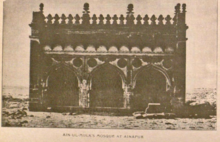| Ain-ul-Mulk's Tomb | |
|---|---|
 | |
| Location | Bijapur |
| Coordinates | 16°50′05″N 75°46′05″E / 16.8346491°N 75.7680482°E / 16.8346491; 75.7680482 |
| Monument of National Importance | |
| Official name | Ain-ul-mulk's tomb |
| Reference no. | N-KA-D124 |
Ain-ul-Mulk's Tomb, also known as Chota Gumbaz, is a mausoleum located on the outskirts of Bijapur, in the Indian state of Karnataka. It is listed as a monument of national importance.
History
The tomb was built during the Adil Shahi period for Ain-ul-Mulk, a nobleman in the court of Ibrahim I. Ain-ul-Mulk had rebelled against the sultan and was killed in 1556.
Description
It is located in Ainapur, which is a suburb of Bijapur located about 2.5 kilometers east of the main city.
The tomb is a square building surmounted by a large, hemispherical dome. Domed pavilions are provided on all four corners of the main dome. The facade has two tiers of three recessed arches on all its sides. Its walls are decorated with stucco work.
Mosque

A highly decorated mosque is located beside the tomb. A parapet wall runs along the roof, dotted by pot-like finials with domical tops.
References
- "Minaret of protected tomb crumbles". Deccan Herald. 2016-10-12. Retrieved 2023-11-27.
- "Alphabetical List of Monuments – Karnataka – Dharwad". Archaeological Survey of India.
- ^ Cousens, Henry (1889). Bijapur, the old capital of the Adil Shahi kings: a guide to its ruins with historical outline. Scottish Mission Industries Company. p. 76.
- ^ Michell, George; Zebrowski, Mark. Architecture and Art of the Deccan Sultanates (PDF). The New Cambridge History of India I : 7. Cambridge University Press. p. 88. Retrieved 2023-07-25.
- "Bijapur's grandeur". Frontline. Archived from the original on 2023-05-25. Retrieved 2023-11-27.
–
Categories: